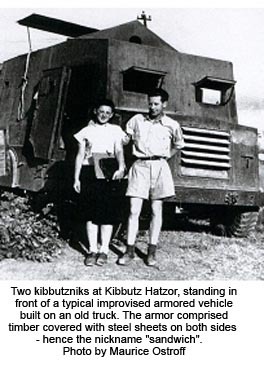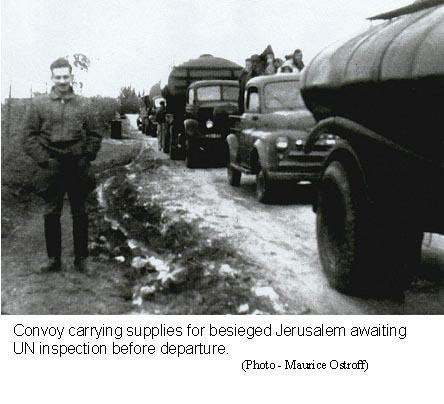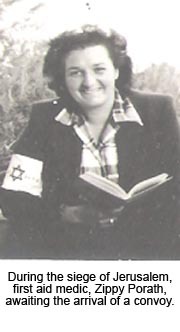Immediately after approval of the November 1947 UN partition resolution[1], Arab militias initiated a siege of Jerusalem, preventing supplies from reaching the city by blocking and ambushing the roads connecting Jerusalem to the rest of the country.
 The essential lifeline road, blocked by the Arabs, passed through Bab-el Wad, Sha’ar HaGai in Hebrew, a narrow valley surrounded by Arab villages on both sides of the hills, effectively commanding the road. The Machal Memorial is today located in this area, close to the starting point of the Burma Road (referred to later in this article). At this point, about 23 km from Jerusalem, the road starts its ascent to Jerusalem.
The essential lifeline road, blocked by the Arabs, passed through Bab-el Wad, Sha’ar HaGai in Hebrew, a narrow valley surrounded by Arab villages on both sides of the hills, effectively commanding the road. The Machal Memorial is today located in this area, close to the starting point of the Burma Road (referred to later in this article). At this point, about 23 km from Jerusalem, the road starts its ascent to Jerusalem.
On April 14, 1948, the Arabs ambushed a large convoy on the way to the Mount Scopus Hadassah Hospital, killing seventy-seven doctors, nurses, university scientists and administrative staff and on April 20, they captured the heights around Sha’ar HaGai, making the closure of the road completely effective.
As soon as the state was declared, the British-trained Transjordan Arab Legion, assisted by British officers, and the Egyptian Army, joined the local militias in enforcing the blockade.
The Legion took up a strategically superior position at the Latrun Monastery and at the police fortress that dominated the road, and fierce battles took place in this area between the Legion and the rudimentary Jewish forces that were attempting to protect the relief convoys.
The 100,000 Jewish residents of Jerusalem were isolated from the Jewish inhabitants in the rest of Palestine and the blockade brought the Jerusalemites to the brink of starvation. The defenders were desperately short of arms and ammunition compared to the well-equipped Arab Legion and it was indeed a grim picture. The situation was exacerbated when the Arab Legion cut off the water supply to Jerusalem.
The mayor of Jerusalem, Dov Yosef, introduced strict food rationing and residents resorted to going out to the fields to pick mallow leaves for food. When the Jerusalem radio station broadcast instructions for cooking mallow, the broadcasts were picked up in Jordan, leading Radio Amman to announce that the Jews were eating donkey and cattle food – a sign they were dying of starvation and would soon surrender.
 The Jews outside of Jerusalem organized convoys in their attempts to break the blockade and bring relief to the desperate city. These convoys comprised crudely made armored vehicles built on old trucks that came to be known as “sandwiches”, because the armor-plating consisted of timber enclosed by metal plates on both sides. The relief convoys were repeatedly attacked on the road to Jerusalem, and suffered very heavy casualties. Some remnants of these vehicles have been left on the Tel Aviv-Jerusalem road as reminders of the losses sustained by the ill-fated convoys.
The Jews outside of Jerusalem organized convoys in their attempts to break the blockade and bring relief to the desperate city. These convoys comprised crudely made armored vehicles built on old trucks that came to be known as “sandwiches”, because the armor-plating consisted of timber enclosed by metal plates on both sides. The relief convoys were repeatedly attacked on the road to Jerusalem, and suffered very heavy casualties. Some remnants of these vehicles have been left on the Tel Aviv-Jerusalem road as reminders of the losses sustained by the ill-fated convoys.
The siege was eventually broken by constructing, under the most arduous conditions, the famous by-pass “Burma Road”, named after the World War II road from Burma to China. This emergency road was so hazardous that the convoys were forced to resort to using donkeys to bring supplies to Jerusalem. Because of the difficult terrain, the first vehicles used, mainly jeeps, had to be pushed by hand in some places. The Burma road was eventually completed and became functional for motor vehicles on June 14, enabling a trickle of desperately needed supplies to start reaching the beleaguered city. The siege ended on July 11 after Jerusalem had been strangled for three months from May 15, when the Jordanian and Egyptian armies intervened to reinforce the Arab militias who had initiated the blocking of roads as early as December 1947.
Machalnik David (Mickey) Marcus, from the USA, a West Point graduate and a Colonel in the U.S. Army in World War II was appointed Commander of the Jerusalem front on May 28, 1948 and played a major role in the planning of the Burma Road. He died in tragic circumstances a few hours before a cease-fire that took effect on June 11, 1948. Knowing very little Hebrew, he failed to respond to a challenge for the password and was shot by a sentry on returning to his quarters in the dark.
Machalnik, Zipporah (Borowsky) Porath, who experienced the siege at first hand, recorded her eyewitness account of the period in letters she wrote regularly to her family in the USA.
 The eminent historian Sir Martin Gilbert wrote . “..I have been entranced by Zipporah Porath’s “Letters from Jerusalem 1947-1948” … one of the most interesting contemporary accounts of the period of Israel’s struggle for independence….extremely readable, very moving…an essential source for the period … of great interest today, especially for the younger generations who did not live through it.”
The eminent historian Sir Martin Gilbert wrote . “..I have been entranced by Zipporah Porath’s “Letters from Jerusalem 1947-1948” … one of the most interesting contemporary accounts of the period of Israel’s struggle for independence….extremely readable, very moving…an essential source for the period … of great interest today, especially for the younger generations who did not live through it.”
| “Letters from Jerusalem 1947-1948” can be ordered from amazon kindle http://bit.ly/LettersFromJerusalem or contact Zippy directly: zip@netvision.net.il |
The following letter was written before the state was declared, while Jerusalem and the world feared that Israel would not survive the Arab onslaught.
Jerusalem, March 29, 1948
Dearest Each of You,
Jerusalem has been holding its breath for two days. A shayarah [convoy] returning from Kfar Etzion was ambushed in the hills of Hebron by thousands of Arabs lying in wait all along the road. For thirty hours our boys fought for their lives before the British Army made any effort to get through to liberate them. Many of my friends and fellow students were trapped in the ambush.
To welcome some of them back, we had an old-fashioned shindig in my room tonight — Itzhak, Yossi and Dov were the guests of honor. In between mouthfuls of hot coffee, they gave us accounts of the battle which made our skins crawl. But despite the horrible ordeal and their frustration at having had to abandon precious vehicles and arms, as loot to the Arabs, they are in good spirits.
After shaving, they actually looked like human beings, in contrast to the gorillas who had marched in an hour before. When they came to say good bye two months ago, they had been told they would be gone for only a week. Who can make plans these days?
The people in this country are simply made of iron. It is unbelievable what they have to endure and how much they’ll yet have to endure before this is over. I am not alone in my feeling of foreboding. Everyone senses that there are very difficult days ahead.
The Arab plan is not only to strangle our communication lines and destroy our outposts but to lay siege to the city and starve us into submission — with a little help from the British. The British don’t believe for a moment that we’ll be able to withstand an invasion by SEVEN ARAB STATES so the Mandatory policy calls for us to surrender the city to Abdullah, the King of Transjordan, when the Mandate ends on May 15th.
We aren’t fooling ourselves. Jerusalem and its 100,000 Jews are in for it. Everyone knows there is no defending the city from a strategic point of view. Our only hope is international intervention in some form — a UN militia or some other neutral force. I can’t believe the entire world would abandon the Holy City without making provisions for safeguarding the sacred places or trying to prevent an outright attack.
Any way you look at it, the picture is already grim. There have been no convoys out of the city for a week and, worse yet, none have arrived in Jerusalem. Food and water supplies are getting critically low and our worst nightmare, isolation from the Jewish State, may ensue. But, believe it or not, spirits are high. Everyday life goes on…with a minimum of the depressing atmosphere you would expect with everyone fully aware of what is in store.
I look at it this way. I am not a better or a worse person, a braver or a weaker person than anyone else here. As long as they can take it, I should be able to and, perhaps, then some. I like living in Palestine. I love Jerusalem. It is my “home” for now. I don’t see why a person should pick up and leave his home because a dangerous madman has gone berserk next door. There is no running away. A couple of miles isn’t going to make a difference. You’d have to run thousands of miles and keep on running the rest of your life.
Love,
Zippy
Dearest Mother, Dad and Naomi,
Hallelujah. A convoy !!! I don’t know which is more exciting — the fact that a convoy finally got through at dawn yesterday with supplies for Passover or that with it came a slew of friends — all alive and well –including Yehudah and Ami. Last night was certainly cause for celebration– but, in the midst of the revelry, the shooting started again and we had to head for shelter.
The convoy was enormous — over two hundred lorries — and not a shot fired at it. For two weeks the Palmach (the Haganah’s commando force) has been carrying out an intensive operation battling every inch of the way with the Arabs for control of the hilly territory, dominated by the Kastel fortification. My friends were in the thick of this all-out effort to open the road for our convoys. [It was code named “Operation Nachshon” after the fellow who was the first to plunge in when Moses divided the Red Sea.] Dare we hope that this is the beginning of clear traffic?
For the first time in months life is looking a little brighter. It started when people ran into the streets to greet the convoy, and the first thing they saw were the heartwarming words, “If I forget thee, oh Jerusalem,” chalked on the lead lorries.
Incidentally, these sabras are strong on chutzpah. This morning, I was supposed to have been at my first-aid post at six a.m. but, without asking me, Yehudah went to my supervisor — he knew him because he had previously been his commander — and got me off the day’s roster so that I would have no choice but to spend my free time with him. He’s only going to be in town for a week; the problem is that ALL my friends are only going to be in town for a week.
When I mentioned to him that I had a noontime appointment about work with someone in the Education Department, he just tagged along: it turned out that the “someone” was his uncle. Naturally, I got preferential treatment. It’s called Protectzia.
I can’t really object to the other thing that Yehudah has arranged without asking me. He’s invited me to his family Seder [Passover celebration]. I was all set to decline gracefully but it seems “Mama” has already been informed about the “guest from America” and I can’t get out of it now
Love,
Zippy
“Letters from Jerusalem 1947-1948” by Zipporah Porath
| “Letters from Jerusalem, 1947-1948” may be ordered from www.amazon.com or directly from Zippy by email to zpletters@gmail.com |
The 1947 UN Partition Plan (Resolution 181)


